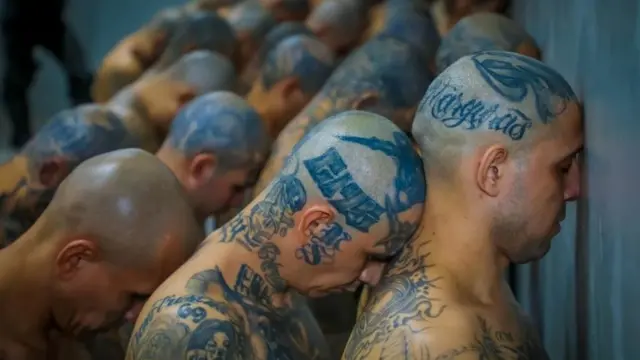Now Reading: Trump’s Explosive Move: 250 Immigrants Sent to ‘World’s Worst Prison’ Despite Judge’s Order
-
01
Trump’s Explosive Move: 250 Immigrants Sent to ‘World’s Worst Prison’ Despite Judge’s Order

Trump’s Explosive Move: 250 Immigrants Sent to ‘World’s Worst Prison’ Despite Judge’s Order
Trump Defies Federal Judge to Deport 250 Immigrants to ‘World’s Worst Prison’
In a stunning power move that’s sent shockwaves through the legal system, President Donald Trump has deported approximately 250 alleged criminals to El Salvador’s notorious mega-prison, directly defying a federal judge’s order to halt the operation. The controversial deportation represents one of the most aggressive immigration enforcement actions since Trump returned to the White House.
Perhaps most extraordinary is the legal mechanism used—the Alien Enemies Act of 1798, a centuries-old wartime law that hasn’t been widely implemented since World War II, when it justified internment camps for Japanese, German and Italian Americans. By invoking this obscure legislation, the administration effectively bypassed normal deportation proceedings and judicial oversight.

An 18th-Century Law for 21st-Century Immigration Enforcement
Within hours of retaking office, Trump signed an executive order declaring the United States under an “invasion” of immigrants allegedly tied to organized crime. This dramatic declaration set the stage for employing the Alien Enemies Act, which permits extraordinary actions against non-citizens during wartime without standard legal protections.
What makes this case particularly unprecedented is that a federal judge attempted to block the deportation while the flight carrying the immigrants was already airborne. In a direct challenge to judicial authority, the administration proceeded with the operation regardless of the court order.
White House press secretary Karoline Leavitt’s response was equally bold: “A single judge in a single city cannot direct the movements of an aircraft carrier full of foreign alien terrorists who were physically expelled from US soil.” This statement alone signals a dramatic shift in how the administration views the relationship between executive power and judicial oversight.
Inside the Trump-Bukele Deal: A New Immigration Partnership
The mass deportation appears to be the result of a strategic agreement between Secretary of State Marco Rubio and El Salvador’s President Nayib Bukele, who has gained international attention for his hardline approach to tackling gang violence in the Central American nation.
Bukele, known for his tough-on-crime policies and social media savvy, enthusiastically documented the arrivals online, sharing footage of handcuffed individuals being escorted from planes to the Counter-Terrorism Confinement Center (CECOT). This facility has earned the ominous nickname of the “world’s worst prison” for its harsh conditions and massive capacity of 40,000 inmates.
-
- Approximately 250 alleged criminals were deported to El Salvador’s CECOT facility
-
- The operation used the 1798 Alien Enemies Act to bypass normal court proceedings
-
- A federal judge attempted to block the deportation while the flight was already airborne
-
- The Trump administration proceeded despite the judicial intervention
- Deportees reportedly include members of MS-13 and the Venezuelan gang Tren de Aragua

Prison Economics: The Financial Side of the Deportation Deal
Bukele revealed surprising details of the financial arrangement behind the deportation deal, suggesting an economic dimension to this international agreement. “The United States will pay a very low fee for them, but a high one for us,” he wrote on Twitter.
The Salvadoran president then outlined how these new inmates would fit into his country’s controversial prison labor system: “Over time, these actions, combined with the production already being generated by more than 40,000 inmates engaged in various workshops and labor under the Zero Idleness program, will help make our prison system self-sustainable. As of today, it costs $200 million per year.”
This economic angle adds another layer to the already complex story—suggesting that beyond immigration enforcement, there may be financial incentives driving El Salvador’s willingness to accept these deportees into its prison system.
High-Value Targets: MS-13 Leaders Among Deportees
Bukele claimed the deportees included 23 MS-13 members “wanted by Salvadoran justice,” with particular emphasis on two ringleaders. “One of them is a member of the criminal organization’s highest structure,” he added, suggesting these weren’t just random deportations but strategically targeted removals.
The Salvadoran president framed these deportations as intelligence windfalls: “This will help us finalize intelligence gathering and go after the last remnants of MS-13, including its former and new members, money, weapons, drugs, hideouts, collaborators, and sponsors.”

Presidential Reactions: Trump Celebrates, Critics Sound Alarms
President Trump didn’t hesitate to celebrate the deportations on his Truth Social platform, using characteristically strong language to describe those deported. “These are monsters sent into our Country by Crooked Joe Biden and the Radical Left Democrats,” he wrote. “How dare they!”
Trump also expressed gratitude toward El Salvador’s president: “Thank you to El Salvador, and in particular President Bukele, for your understanding of this horrible situation, which was allowed to happen to the United States because of Democrat leadership. We will not forget.”
Meanwhile, human rights organizations and legal experts have raised significant concerns about both the process and destination. CECOT has been criticized for its harsh conditions, and the operation’s disregard for judicial oversight raises profound constitutional questions about executive power and the rule of law.

Constitutional Crisis? Executive Power vs. Judicial Authority
Perhaps the most significant aspect of this story isn’t the deportation itself, but the precedent it sets for presidential power. By proceeding with the deportation despite a judge’s ruling against it, the administration has created what some legal scholars describe as a direct challenge to the separation of powers—a foundational principle of American government.
Immigration advocates argue that the use of the 1798 law to bypass standard deportation procedures violates due process rights, while international observers question whether deporting individuals to a facility with CECOT’s notorious reputation complies with human rights standards.
As both presidents celebrate what they frame as a victory in the “fight against organized crime,” this unprecedented deportation operation signals a dramatic shift in U.S. immigration enforcement. The full legal, political, and diplomatic consequences of this extraordinary action will likely unfold in the coming weeks and months, potentially reshaping the boundaries of executive power in immigration enforcement for years to come.










